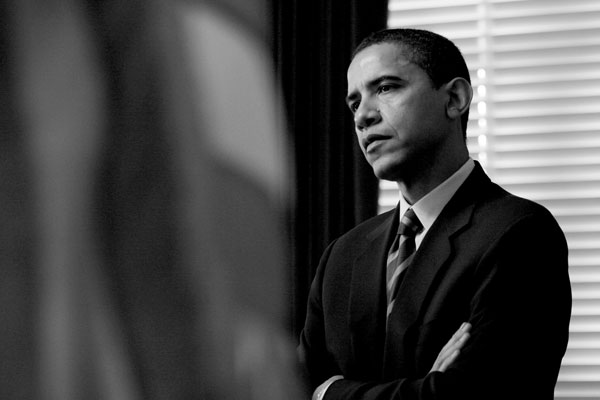Democrats Take On National Security « The Washington Independent
Jul 31, 202050.3K Shares1.7M Views
Sen. Barack Obama (D-Ill.) (WDCpix)
DENVER — When last the Democrats decided to make national security a theme at their convention, biography was everything. John Kerry, the party’s 2004 nominee, was a bona fide war hero, and the campaign made sure everyone knew it. Starting with Kerry’s arrival at the FleetCenter from across Boston’s Charles River, to recall his Vietnam service aboard a Swift Boat; to the parade of retired generals and admirals declaring their support; to Kerry’s famous opening line declaring “reporting for duty,” the Democrats gambled that Kerry’s heroic service would invest him with the national-security bona fides to elect him president.
Beneath the pageantry, however, was a bluff. Kerry’s actual national-security message didn’t draw sharp distinctions with President George W. Bush’s policies. Kerry had voted for the Iraq invasion and refused to repudiate his decision. Kerry embraced the president’s “war on terror” formulation and tactics for addressing the Al Qaeda terrorist network. Kerry’s critique of Bush focused on his competence, suggesting that the Democratic nominee embraced Bush’s policies and wanted only to fine-tune them. The election results — Bush won a more solid victory then in 2000 — speaks to the wisdom of that strategy.
Illustration by: Matt Mahurin
When the Democrats talk tonight about national security, 2004 will appear like a long-forgotten, sepia-toned era. The campaign of Sen. Barack Obama (D-Ill.) represents a quantum leap in terms of both style and substance. Woodrow Wilson School of Public and International Affairs and an influential foreign-policy thinker in Democratic circles. “Crisis always creates opportunity, and this is no exception.”
It can be fairly said that the liberal positions on Iraq have been vindicated. Even Bush has been forced to accept the principle of setting a timetable for withdrawing from Iraq, something he has said for four years would be a disaster — and something Obama has campaigned on from the beginning. Even if Bush hadn’t accepted that principle, Nouri al-Maliki, the Iraqi prime minister, effectively ended the debate by demanding that the U.S. withdraw from Iraq entirely by 2011.
That has discredited not only Bush and Sen. John McCain, the presumptive GOP nominee, but also the Democratic Party’s Iraq hawks, who also counseled against withdrawal. Yet those advisers have been notably absent from the Obama campaign.
Unlike his rivals for the Democratic nomination — and his predecessor for it — Obama surrounded himself not with the sensible-center of Democratic foreign-policy advisers, but those who found themselves out of favor in Democratic circles for being too liberal. They were considered too opposed to the war in iraq, too opposed to accommodating Bush and too forthright about traditional liberal internationalism. The hawkish Richard Holbrooke, a close confident of Sen. Hillary Rodham Clinton, Al Gore and Kerry, is out, while his old friend and rival, the relatively dovish Anthony Lake, is in.
Obama’s core of most trusted foreign-policy advisers are young men: Denis McDonough from the liberal Center for American Progress and an ex-adviser to former top Senate Democrat Tom Daschle, is in his mid 30s; Ben Rhodes, a protege of Lee Hamilton, the elder statesman from the 9/11 Commission and the Iraq Study Group, is barely 30.
Several other top aides also come from the liberal wings of the party: former State Dept. hands Greg Craig and Susan Rice; Sarah Sewell from Harvard’s Carr Center for Human Rights; Clinton-era Navy Secretary Richard Danzig, and ret. Air Force Gen. Scott Gration, who managed the air war during the invasion of Iraq.
Several of them have been on hand in Denver during the past few days to offer a glimpse of both the substance and the style of Obama’s foreign policy.
Somewhat surprisingly, Danzig suggested that an Obama a method of warfare that emphasizes economy of force, intimate knowledge of host populations and politico-economic incentives to win that population’s allegiance — to the global fight against Al Qaeda. “I don’t think this is the property of the Bush administration or Sen. McCain,” Danzig saidat a forum Tuesday sponsored by the Truman National Security Project. “We in the Obama campaign have very much supported that counterinsurgency doctrine.”
Danzig, who has an impish streak, openly attacked McCain’s steadiness in judgment — the heart of McCain’s argument to be president. He did so by saying that Obama possesses an “evenness of temperament… to contrast with what I’ll call the other candidate.” Pressed by Rep. Adam Smith (D-Wash.) to say McCain’s name, Danzig replied, “John McCain is well known for his ability to lose it.”
Both Danzig and Craig — one of the first Clinton associates to sign on with Obama — indicated an eagerness to take actions on the world stage that just a few years ago would have been unacceptable to the Washington-based foreign-policy consensus. Obama “will engage the U.S. with Iran,” Craig said at a forum Wednesday morning sponsored by the New America Foundation. “We took heat for [saying] it, but he stood tall by it. … as we found over and over and over again, the American people agreed with him. They thought it was natural, strong and wise for us to engage with our adversaries.”
Craig and Danzig both promised a direct and major presidential engagement with the Muslim world during the first year of Obama’s term, with the potential president making a speech in a major Islamic capitol — something unthinkable from Bush. “[It will] lead to a greater understanding, greater dialogue and greater exchange, I hope with the Islamic world,” Craig said.
Yet Danzig stated bluntly that Obama is open to a unilateral military strike on Al Qaeda in Pakistan if the Pakistani government proves intransigent. “I think that there is a role for force [in Pakistan], and Sen. Obama has been clear about this,” Danzig warned, reprising a point that earned Obama media jibes last year. “We have to be honest in saying we have some interests that are at play there.”
Perhaps the most striking example of Obama’s break from the last several years of Democratic foreign-policy timidity has come from, ironically, Kerry.
Kerry endorsed Obama in January, shortly after Obama’s Iowa victory, while the race for the Democratic nomination was still in flux. Since then, he has emerged as a pugnacious advocate for Obama on the campaign trail and on the chat-show circuit, displaying an intensity that some observers think was lacking in his own 2004 run for the White House.
In that race, Kerry tred cautiously on security questions. In the summer of 2004, for example, that he would have invaded Iraq even if he had known it did not possess weapons of mass destruction, and critiquing Bush based on questions of implementation rather than basic wisdom.
That Kerry is gone. “The concept of, quote, ‘war on terror’ is a terrible misnomer for the challenge we face, which is a global counterinsurgency,” Kerry said Wednesday morning at the New America Foundation panel. “We need to rethink — not rebrand, rethink — what to do with our information strategy, since counterinsurgency is based on the center of gravity of the population.”
Pivoting to a basic critique of the war he ill-fatedly voted for — and later apologized for voting for — Kerry continued, “Iraq has worked completely counter to that… [and] this is a central thesis, and one of the great strengths, of Obama’s strategy. He understand it. John McCain does not.” The speculation is that Kerry is auditioning to become Obama’s secretary of state.
Campaign insiders say to expect a lot more along Kerry’s lines during tonight’s speeches. Kerry, of course, will speak tonight. Sen. Jack Reed (D-R.I.), a West Point graduate and retired Army Ranger, is expected to address the damage done to the military by Bush and continuing on into a potential McCain administration.
Iraq veterans John Melvin and Tammy Duckworth — a netroots favorite and unsuccessful candidate for an Illinois congressional seat in 2006 — will discuss the war. And Sen. Joe Biden, the party’s combatative vice presidential nominee, is expected to excoriate McCain on every aspect of his foreign policy, his judgment and his competence to be commander-in-chief.
All of this, of course, might not work. Polls still show that while foreign policy ranks behind the economy in terms of what the public will vote on, McCain is outperforming Obama on key questions of who is more trusted on terrorism and to run the military. And many liberals here in Denver think that the convention so far has soft-pedalled the highly unpopular Iraq war to the candidate’s detriment.
Yet what the Obama campaign has already proven is that, unlike in 2004, the choice facing the country is between the left-most and right-most poles of foreign-policy thinking in the two parties. The November election, therefore, can be fairly said to provide a mandate to the next president on what to do about Iraq, Afghanistan/Pakistan, Iran and a host of other foreign-policy issues. And that mandate will, Obama advisers believe, inspire action.
“The impact of an election that produces an Obama presidency is huge,” Craig said, since Obama would be the nation’s first African-American president. “I think it strengthens the capacity of the president [to lead]… McCain has a strategy to remain in Iraq, and if that’s what country wants, they can vote on it.” Naturally, of course, Craig doesn’t think the country will.,

Paula M. Graham
Reviewer
Latest Articles
Popular Articles

